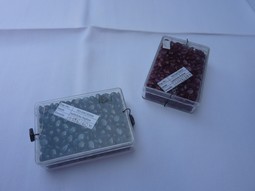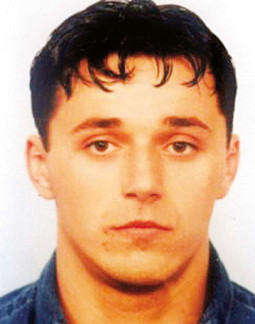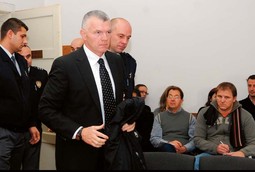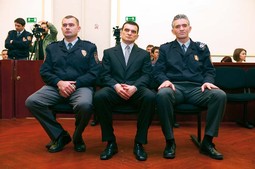Published in Nacional number 725, 2009-10-06
Exclusive: Nacional locates Zagorec's jewels
A secretive witness has shown a Nacional reporter a part of the jewels for whose theft Vladimir Zagorec was convicted, and then delivered a letter from a certain G. Z. that has been involved in the sale of sapphires and rubies on the international black market since the year 2000
 RUBIES AND SAPPHIRES IN SMALL BOXES A person that contacted the Nacional editorial office showed a Nacional reporter two small boxes filled with sapphires and rubies. A few days ago Nacional discovered a part of the jewels that are alleged to be those that retired General Vladimir Zagorec took from the Ministry of Defence, and for which he has already been convicted, pending appeal, to seven years in prison. Nacional has come into this exclusive discovery thanks to a male caller that contacted the Nacional editorial office requesting a meeting to discuss an important topic.
RUBIES AND SAPPHIRES IN SMALL BOXES A person that contacted the Nacional editorial office showed a Nacional reporter two small boxes filled with sapphires and rubies. A few days ago Nacional discovered a part of the jewels that are alleged to be those that retired General Vladimir Zagorec took from the Ministry of Defence, and for which he has already been convicted, pending appeal, to seven years in prison. Nacional has come into this exclusive discovery thanks to a male caller that contacted the Nacional editorial office requesting a meeting to discuss an important topic.
At the meeting, held at a Zagreb café on 26 September, the person in question produced two small boxes filled with jewels. One of the boxes contained rubies, and the other sapphires.
Nacional was allowed by the person in question to photograph the small boxes with the jewels. The boxes containing the precious stones bear inscriptions that they are manufactured in Germany, each has a small seal and a certificate of it contents. The boxes shown to Nacional contain 1156.6 carats of sapphires and 1147.2 carats of rubies.
A few months ago Vladimir Zagorec was convicted, pending appeal, for the theft of jewels he took from his office when leaving his post at the Defence Ministry. The estimated value of these jewels is about 5 million dollars. In the indictment it stands that the precious stones were brought to him by controversial German jeweller Josef Rothaichner, as a form of security for the money he received from the Defence Ministry for the procurement of the S-300 rocket system. The precious stones were not reported by Zagorec, and later stolen by him. Several witnesses spoke of the existence of these precious stones during the trial, and there was some material evidence, such as the small boxes in which a part of these precious stones were kept. There has, however, been no trace of the controversial precious stones until now. The person who brought the jewels to Nacional said that they were only a go-between working on behalf of two persons who sold the jewels for Vladimir Zagorec. This go-between told Nacional that these two individuals were willing to speak out about all of the details related to the controversail jewels, and that one of them is in possession of the documentation that was in the pilot's bags together with the boxes contianing the jewels. The go-between says that the documentation can establish a direct connection between Zagorec and the jewels.
At the meeting the go-between told Nacional that both of the individuals that sold the jewels on Zagorec's behalf are willing to give statements to the competent national authorities so that their testimony could be used as additional evidence of Zagorec's guilt. Besides this, the go-between told Nacional that both persons are willing to turn over the jewels and documentation that could, in their opinion, establish a direct connection between Zagorec and the jewels. To demonstrate their seriousness these two individuals have shown Nacional, by way of the go-between, that they do in fact have the controversial jewels Zagorec pilfered in their possession. To turn over the jewels and documentation in question, and to give statements to the competent national institutions, these two persons have told Nacional by way of the go-between that they seek in return that the authorities provide them with a measure of satisfaction, which could be characterised as a rational and understandable return favour. At issue are not financial demands, or anything from which these two individuals could derive any kind of material benefit.
A few days later, by way of the same go-between, one of these two individuals sent Nacional a letter in which it put forth a part of the story of how they sold jewels for Zagorec, and a part of the documentation that was with the jewels in the nag that Zagorec misappropriated from the Ministry of Defence when he left the institution. The letter is written by a G. Z. (full name known to the editorial office). This is an individual that has so far not been brought in connection with the Zagorec stolen jewels scandal. The contents of this letter reveal that he sold Zagorec's jewels together with Ico Matekovic, who has been convicted to a multi-year prison sentence for the kidnapping of Zagorec's then underage son Tomislav.
Matekovic had already contacted the State Attorney's Office in March offering new information concerning Zagorec's jewels. In return for this information and testimony concerning the jewels Matekovic requested that the State Attorney's Office take a more positive approach to his prison sentence.
He sought a more favourable treatment in prison; those he could get based on his status as an inmate. It is very likely that Matekovic decided to do so because he was returned to the closed part of the Lepoglav penitentiary after the murder of Ivana Hodak, the daughter of Zagorec's attorney Zvonimir Hodak, while he had been interred prior to the murder in the semi-open section of the prison. Matekovic as a result went on a hunger strike for a time, starting on 31 October of 2008. He claimed that it was his peaceful way of protesting against the violation of his rights as guaranteed to him by legislation pertaining to prison incarceration and the standing rules of the Lepoglav penitentiary.
 IVAN MATEKOVIC AKA ICO One of the participants of the kidnapping of Zagorec's sons, and of the fencing of the jewels
The State Attorney's Office then began looking into Matekovic's allegations, but did not offer him any more favourable treatment in prison and was quite reserved towards him, probably in part because they could not be sure that he did in fact have the jewels in question. It was not long afterwards that the State Attorney's Office launched new proceedings against Zagorec, but these have not seen any progress until now. At the State Attorney's Office they have decided to formally initiate the proceedings, but also to keep it separate from the matter of the jewels Zagorec misappropriated, and for which he has already been convicted pending appeal. In the spring legal sources revealed for Nacional that the State Attorney's Office has launched the Jewels 2 investigation on the basis of this information from Matekovic, again on suspicion that Zagorec has, along with the misappropriation of the jewels from the Defence Ministry for which he has already been convicted, also misappropriated other jewels of a currently unknown value.
IVAN MATEKOVIC AKA ICO One of the participants of the kidnapping of Zagorec's sons, and of the fencing of the jewels
The State Attorney's Office then began looking into Matekovic's allegations, but did not offer him any more favourable treatment in prison and was quite reserved towards him, probably in part because they could not be sure that he did in fact have the jewels in question. It was not long afterwards that the State Attorney's Office launched new proceedings against Zagorec, but these have not seen any progress until now. At the State Attorney's Office they have decided to formally initiate the proceedings, but also to keep it separate from the matter of the jewels Zagorec misappropriated, and for which he has already been convicted pending appeal. In the spring legal sources revealed for Nacional that the State Attorney's Office has launched the Jewels 2 investigation on the basis of this information from Matekovic, again on suspicion that Zagorec has, along with the misappropriation of the jewels from the Defence Ministry for which he has already been convicted, also misappropriated other jewels of a currently unknown value.
Ico Matekovic has offered the State Attorney's Office information on all the jobs he and his brothers carried out for Vladimir Zagorec. Matekovic has stated that Zagorec asked him and his brothers to try and sell the jewels taken from the Ministry of Defence. Ico Matekovic also offered to reveal what he knew about some other witnesses that could corroborate the authenticity of his story, but declined to reveal their identity. The case file contains the photos of at least four small boxes full of jewels that Matekovic submitted to the State Attorney's Office. Some legal sources then said that the State Attorney's Office was then on the trail of the controversial jewels, and some even claimed that Matekovic made a part of these jewels available to the competent national institutions to further convince them of the veracity of his information. These claims, however, were not founded. Whatever the case, after Matekovic confided to them, the State Attorney's Office began suspected that Zagorec had not received jewels only once from one person for one transaction, but that it had been an established way of doing business used on several occasions, and which Zagorec used to gain personal wealth.
It is possible that the case file of the new investigation the State Attorney's Office has called the Jewels 2 case actually contains photos of the boxes containing jewels that Libero Matekovic offered Zagorec's attorney Zvonimir Hodak a few months ago in return for monetary compensation. Hodak reported it all to the police and informed the competent national institutions to this effect. Zvonimir Hodak, however, also tried to manipulate this situation. Two court hearings ago in the trial of Vladimir Zagorec he told reporters that persons that had taken part in the kidnapping of Zagorec's son had offered evidence that would exonerate Vladimir Zagorec of any suspicions that he had misappropriated jewels, and that they sought 3 million euro of him in return for this evidence. Hodak referred to this as blackmail, and added "The blackmail went something like this: give us three million, and we will provide the court with evidence that you have never seen these precious stones, or known of their existence. If you don't give us the money, we will submit the photos of the jewels to court and give testimony that you gave it to us to sell."
Hodak said that the photos, in which the small boxes with precious stones look like chocolates, and the amount of the extortion demanded, were delivered to his office and that the "people who had abducted Zagorec's underage son was behind it all." Hodak also said that a statement to this effect was already in the court file, and that the police were carrying out an investigation. He said that the police had already questioned all of the employees in his office, reviewed all of the telephone conversations and confiscated the photos. Hodak, however, was not telling the truth when he said that unknown persons had offered him evidence that would exonerate Vladimir Zagorec. At issue is evidence that does not work in Zagorec's favour, and which they would hand over to Zagorec in return for money. Both Vladimir Zagorec and Zvonimir Hodak have on several occasions stated that the entire scandal surrounding the misappropriated jewels was in fact a political show trial in which there no jewels actually exist or ever existed. They could claim this thus far only because the jewels in question were not submitted among the evidence presented to the court during the Zagorec trial. Nacional has now been shown jewels that are alleged to be exactly those that Zagorec misappropriated, and a letter has been submitted whose author reveals to the public a part of the story about how they peddled Zagorec's jewels.
 HRVOJE PETRAC gave testimony against Zagorec during the jewels trial
Nacional reveals the contents of this letter in its entirety. "In early 1999, I met a member of the Zagreb criminal underground, then involved in usury, and later one of the participants of the abduction of General Vladimir Zagorec's son. I borrowed large sums of money from this person, which I then lent out, and on which we both earned handsome profits. We met and socialised on a daily basis, usually at the Downtown café on No. 4 Teslina Street.
HRVOJE PETRAC gave testimony against Zagorec during the jewels trial
Nacional reveals the contents of this letter in its entirety. "In early 1999, I met a member of the Zagreb criminal underground, then involved in usury, and later one of the participants of the abduction of General Vladimir Zagorec's son. I borrowed large sums of money from this person, which I then lent out, and on which we both earned handsome profits. We met and socialised on a daily basis, usually at the Downtown café on No. 4 Teslina Street.
At the time I was engaged in quite a bit of gunrunning, dealing drugs and the like, which I confided to this member of the criminal underground, and on one occasion offered them a job in connection with guns, gold, explosives and the like, but he was not interested at the time in this kind of work and worked only on loaning out money at loan shark rates. I should also point out that I on several occasions sought a larger quantity of Uzi sub-machine guns (about 4,000 units), which I was to have sold to the Kosovo Liberation Army (UCK), backed then by powerful and respected Kosovar politicians with whom I met personally. Sometime in February of 2001 the loan shark in question contacted me in connection with, as he said, something very interesting, so we agreed to meet at the Downtown café on No. 4 Teslina Street in Zagreb.
He then offered me precious stones (sapphires, rubies and emeralds), since he knew that my contacts with various crime channels and ability to sell these kinds of goods. The price of these stones was at the time from 1,400-2,000 US dollars, and they were offered to me at 1,100 German marks per carat. Given that I knew a powerful and wealthy narcotics dealer who owned goldsmiths and jewellery shops as a front for his drug business, I brought them to him for sale. I remember having received 3 boxes (green, blue and red) the first time as a sample, and that there was talk of some 10,000 carats in total.
The precious stones I received and sold were grouped into several classes (clarity, colour, carat weight) and it was there parameters in fact that were labelled on the transparent rectangular boxes, and which are identical to those already published by Nacional, and with the boxes containing precious stones in my possession, and which I gave to the author of this text to photograph in order to establish their credibility. I came with the jewels to an appraiser located in the centre of Prague (Vaclavske Namesti square), sent by a buyer. It was then that I became acquainted with the methods of jewel swindles such as various exchanges, exchanging for weapons, monetary guarantees and the like. Along with the jewels I also received some certificates, appraisals and some other papers, which came my way by accident (by mistake). At the transfer of the first quantities of jewels, namely these papers remained in the black bag together with the stones.
These papers included offers from some Croatian banks as guarantees for loans issued to private individuals. I later learned that these jewels had been offered at several locations, but by whom and to whom I do not know. In short I transferred the jewels on two occasions; the first time a quantity of 507 or 508 carats (of all kinds), i.e. 150 small boxes, and that was brought in the black leather bag. The money I received from these 508 carats (about 560,000 German marks) was in small denominations (of 50 DM notes), which I took to the loan shark in a sports bag. We met in the centre of town, where he took the money and went to Zrinjevac (so he said). He returned in about an hour. When he returned he said that the "general" was upset because the money was in small denominations. That was the first time that I heard him mention the name "General Zagi". I did not at the time know who General Zagi was. The money was small denominations because when it came to jobs connected to drugs, most of the money is in small bills. As the dealer was getting some more drug money in a few days, he was ready to buy another large quantity of jewels. He then requested a further 320 carats.
 SEVEN YEARS IN PRISON FOR THE THEFT OF JEWELS Vladimir Zagorec has already been convicted pending appeal for the precious stones that went missing from the Defence Ministry safe
In the meantime I had contacted a friend of mine from Herzegovina, that is from Posusje, whom I also made the same offer. He had contacts via a go-between from Virije with some people from Kazakhstan, who were willing to deliver enriched uranium for them. Since the Herzegovinian and this man from Virije had a good buyer for this "uranium" from the Middle East, the final price for the stones was much greater (about 1,500 US dollars per carat). I transferred the samples of these jewels to the Herzegovinian in Koprivnica, where I met up with him, and he continued on to Hungary. The following day he notified me that the deal for uranium was set, and I gave him 20 boxes (about 50 carats) and received 60,000 US dollars, and the rest in a few days time. As the Herzegovinian told me the uranium was stolen from a company in Kazakhstan (I think he mentioned Kazaprom or something like that). I transferred another 110 boxes to a Turk resident in the Czech Republic.
SEVEN YEARS IN PRISON FOR THE THEFT OF JEWELS Vladimir Zagorec has already been convicted pending appeal for the precious stones that went missing from the Defence Ministry safe
In the meantime I had contacted a friend of mine from Herzegovina, that is from Posusje, whom I also made the same offer. He had contacts via a go-between from Virije with some people from Kazakhstan, who were willing to deliver enriched uranium for them. Since the Herzegovinian and this man from Virije had a good buyer for this "uranium" from the Middle East, the final price for the stones was much greater (about 1,500 US dollars per carat). I transferred the samples of these jewels to the Herzegovinian in Koprivnica, where I met up with him, and he continued on to Hungary. The following day he notified me that the deal for uranium was set, and I gave him 20 boxes (about 50 carats) and received 60,000 US dollars, and the rest in a few days time. As the Herzegovinian told me the uranium was stolen from a company in Kazakhstan (I think he mentioned Kazaprom or something like that). I transferred another 110 boxes to a Turk resident in the Czech Republic.
The jewels I received the next time were of a smaller carat weight and only totalled about 300 carats. The Turk only took these because he was interested for as were available at the same price. The second time I took the loan shark money for jewels totalling about 320,000 German marks, but I was short by a few boxes that were still with me (about 40,000 German marks). I relayed the entire story of the uranium to the loan shark, and told him of the return of the remainder of the money in a few days time, and he covered it all for the General (so he said). I held off then with the jewels that had been ordered, because the option related to the uranium was more lucrative, but that had to be waited out some time to check on the quality of the uranium from the first transaction.
This uranium was not, however, of sufficient quality, as it had not been enriched sufficiently, and that transaction fell through. The loan shark notified me that he had sold a quantity in Belgium through a friend from Rotterdam, but that these people had not been satisfied with the quality, and that some had been returned to him, and asked me close up the deal with the Turk. That was the first time that I asked him what would happen of the police found jewels on anybody, and he answered saying that as far as Croatia was concerned that nothing would happen, because the general was a very powerful person and had everything under control. I asked him this because one of the Turk's couriers (a Czech) had been nicked, who had been taking money and some jewels to Istanbul. In August of 2001 the Turk notified me that he had some difficulties in Afghanistan and that the purchase would have to wait a while, but that he could pay a 300,000 German mark down payment for the job, which I however did not want to take as it would only obligate me further.
I was arrested in Zagreb in September of 2001 for possession of narcotics and sentenced to 3 years in prison. I then lost all contact with the loan shark. The kidnapping was later and my contact was on the run. We met again after a time in a penitentiary in Croatia where he then admitted that General Zagi was in fact General Vladimir Zagorec, and through our conversation I grasped that he did not know of the documentation in the bag, and that they had wound up in my hands by mistake."
Related articles
Four countries investigate crime at Hypo bank
An important international meeting of representatives from the state prosecutor's offices of Austria, Germany, Liechtenstein and Croatia, was held at… Više
Latest news
-
28.10.2010. / 14:15
'A profitable INA is in everyone's interest'
-
28.10.2010. / 09:38
Sanader’s eight fear SDP — Won’t bring down Government
-
21.10.2010. / 15:02
Interior Ministry turned a blind eye on Pukanic assassination
-
20.10.2010. / 09:34
Barisic could bankrupt HDZ




